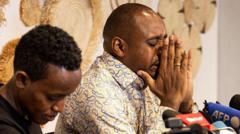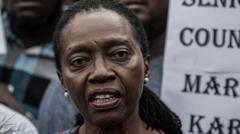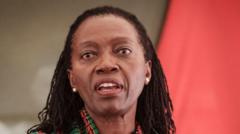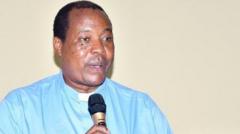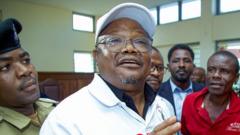Tanzania's Independent National Elections Commission announced the disqualification of the Chadema party from upcoming elections after its leader faced treason charges. This situation raises concerns about political freedoms and electoral fairness in a country with a long-standing ruling party.
Tanzania's Opposition Party Banned from Upcoming Elections Amid Controversial Charges

Tanzania's Opposition Party Banned from Upcoming Elections Amid Controversial Charges
Following the arrest of Tundu Lissu, the leader of Tanzania's main opposition party Chadema, the party has been barred from the upcoming elections due to failing to sign a code of conduct.
Tanzania’s principal opposition party, Chadema, has been prohibited from participating in the forthcoming elections, an action taken shortly after its leader, Tundu Lissu, was arrested and charged with treason. Ramadhani Kailima, the director of elections at the Independent National Elections Commission, stated that the party failed to sign a required code of conduct document, resulting in its disqualification for the October elections. This recent turn of events is likely to enhance the ruling Chama Cha Mapinduzi (CCM) party's prospect of maintaining its power, which it has held for nearly sixty years.
Mr. Kailima confirmed that any party not signing the code of conduct would be excluded from the general elections, emphasizing the implications this decision holds for Chadema, which will also be barred from future by-elections until 2030. In defiance, Chadema had previously declared its intent not to take part in the code of conduct signing ceremony, leveraging this stance as part of their advocacy for electoral reforms.
Tanzania’s upcoming parliamentary and presidential elections were anticipated to be highly contested, with Lissu expected to challenge the current president, Samia Suluhu Hassan. After taking office in 2021 following the death of John Magufuli, President Hassan received initial accolades for pledging to undo some of her predecessor's more autocratic practices. However, opposition members accuse her administration of increasing repression of political dissent, citing instances of arrests and disappearances in their ranks, which the government has refuted while initiating an inquiry into these allegations.
Chadema and Lissu have been voices for democracy, with Lissu promoting the slogan “No Reforms, No Election,” insisting that electoral processes cannot be deemed free and fair without substantial reforms, amplifying his call for a restructured electoral commission independent of presidential appointments. Authorities have accused Lissu of inciting rebellion and attempting to disrupt the election; his current detainment follows a long history of political intimidation, including a near-fatal assassination attempt in 2017.
As Lissu awaits his adjourned treason hearing, scheduled for April 24, legal observers, including his attorney, contend that these allegations are rooted in the political landscape, reflecting the broader context of Tanzania’s struggle for political pluralism and reform.





